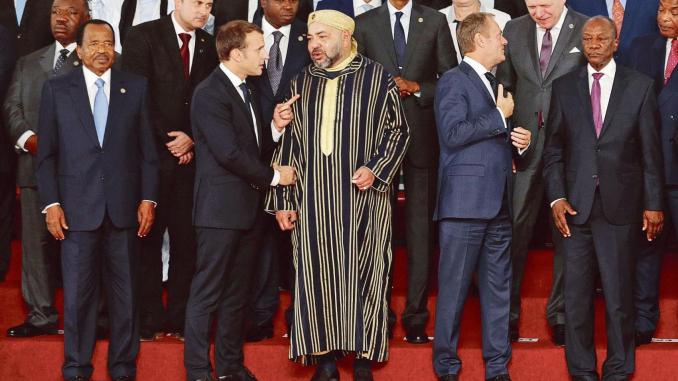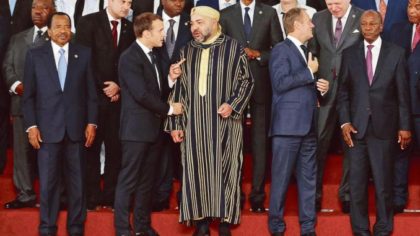
AU-EU Meeting on Libya: Morocco in, Algeria out
 The exclusion of Algeria from the meeting on Libya, held as part of the AU-EU Summit in Abidjan, came to no surprise to analysts who see Algiers as an unreliable partner in resolving Libya’s pressing issues: stability, security and migration.
The exclusion of Algeria from the meeting on Libya, held as part of the AU-EU Summit in Abidjan, came to no surprise to analysts who see Algiers as an unreliable partner in resolving Libya’s pressing issues: stability, security and migration.
Migration, the main issue on the table of the AU-EU Summit, was also the top priority discussed during the meeting by African and European leaders following the appalling atrocious practices against sub-Saharans in Libya.
Algiers, which opposed the ousting of long-serving dictator Gaddafi, uses Libya’s turmoil to warn against any domestic demands for political and economic reform.
For the Algerian regime, democracy is equal to strife.
On the other hand, the participating countries see little contribution of Algeria when it comes to tackling migration challenges. Recently, Algeria was lambasted by international rights watchdogs, including Human Rights Watch and Amnesty International for arbitrary expulsions of Sub-Saharans who were abandoned by Algerian authorities on the borders with Niger in harsh conditions.
In four years, over 20,000 Sub-saharan nationals were cruelly expelled by Algerian authorities who abandoned them in the desert border.
The very participation of Algeria’s Prime Minister Ahmed Ouyahya is an enough reason for sidelining Algeria at such a key meeting of the AU-EU Summit. Ouyahya’s racist stands regarding sub-Saharans and his negative approach towards migration is no secret. Last July, he shamefully endorsed the crackdown on migrants, heinously describing Sub-Saharans in Algeria as a “source of crime, drugs and other calamities.”
For its part, Morocco attended the meeting on Libya along with Niger, Chad, African Officials and EU officials. Although Morocco does not share borders with Libya, it shares the concern of the Libyan people to a stable country. It has also shown commitment to Libya’s peace process by hosting the warring factions’ negotiation process, which culminated in the Skhirate agreement.
On migration, The North African Kingdom has become a key interlocutor in the continental level thanks to its national policy that earned it respect and leadership in the region. The comprehensive migration policy adopted by Morocco has become a shining example that puts Morocco on the forefront of advocates for a human approach preserving the basic rights of migrants.
In his message to the 5th African Union-European Union summit in Abidjan, urged again African countries to shoulder their responsibilities in terms of guaranteeing the rights and dignity of African migrants on their soil, in accordance with their international commitments, and to do away with the shameful, inhuman practices inherited from a bygone era.
So far, 25,000 migrants have gained residency status in Morocco in the first successful phase of a regularization campaign and nearly 26,000 migrants have submitted to Moroccan authorities their requests to gain residency permits as part of the second phase of the regularization campaign that was launched in December 2016 upon directives from King Mohammed VI.
Morocco’s domestic achievements on migration enable it to take leadership at the continental level in championing migrants’ rights.
In keeping with its solidarity with African states, Morocco has decided at the AU-EU Summit to send planes to repatriate 3,800 migrants mostly from West Africa who are stranded in Libya, a move that was highly appreciated by African leaders and human rights advocates.
